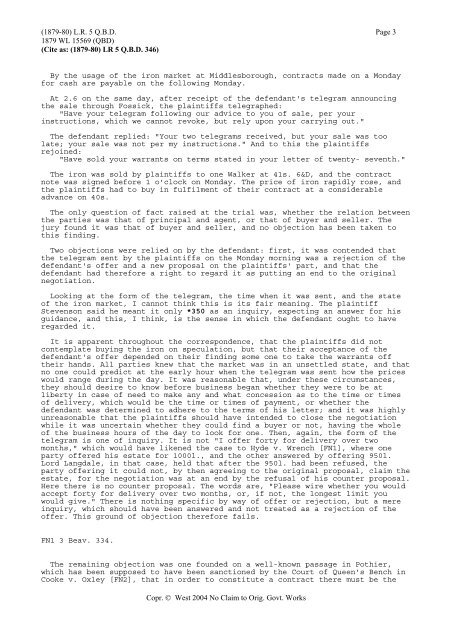Tesco v Constain - Thomson Reuters
Tesco v Constain - Thomson Reuters
Tesco v Constain - Thomson Reuters
Create successful ePaper yourself
Turn your PDF publications into a flip-book with our unique Google optimized e-Paper software.
(1879-80) L.R. 5 Q.B.D. Page 31879 WL 15569 (QBD)(Cite as: (1879-80) LR 5 Q.B.D. 346)By the usage of the iron market at Middlesborough, contracts made on a Mondayfor cash are payable on the following Monday.At 2.6 on the same day, after receipt of the defendant's telegram announcingthe sale through Fossick, the plaintiffs telegraphed:"Have your telegram following our advice to you of sale, per yourinstructions, which we cannot revoke, but rely upon your carrying out."The defendant replied: "Your two telegrams received, but your sale was toolate; your sale was not per my instructions." And to this the plaintiffsrejoined:"Have sold your warrants on terms stated in your letter of twenty- seventh."The iron was sold by plaintiffs to one Walker at 41s. 6&D, and the contractnote was signed before 1 o'clock on Monday. The price of iron rapidly rose, andthe plaintiffs had to buy in fulfilment of their contract at a considerableadvance on 40s.The only question of fact raised at the trial was, whether the relation betweenthe parties was that of principal and agent, or that of buyer and seller. Thejury found it was that of buyer and seller, and no objection has been taken tothis finding.Two objections were relied on by the defendant: first, it was contended thatthe telegram sent by the plaintiffs on the Monday morning was a rejection of thedefendant's offer and a new proposal on the plaintiffs' part, and that thedefendant had therefore a right to regard it as putting an end to the originalnegotiation.Looking at the form of the telegram, the time when it was sent, and the stateof the iron market, I cannot think this is its fair meaning. The plaintiffStevenson said he meant it only *350 as an inquiry, expecting an answer for hisguidance, and this, I think, is the sense in which the defendant ought to haveregarded it.It is apparent throughout the correspondence, that the plaintiffs did notcontemplate buying the iron on speculation, but that their acceptance of thedefendant's offer depended on their finding some one to take the warrants offtheir hands. All parties knew that the market was in an unsettled state, and thatno one could predict at the early hour when the telegram was sent how the priceswould range during the day. It was reasonable that, under these circumstances,they should desire to know before business began whether they were to be atliberty in case of need to make any and what concession as to the time or timesof delivery, which would be the time or times of payment, or whether thedefendant was determined to adhere to the terms of his letter; and it was highlyunreasonable that the plaintiffs should have intended to close the negotiationwhile it was uncertain whether they could find a buyer or not, having the wholeof the business hours of the day to look for one. Then, again, the form of thetelegram is one of inquiry. It is not "I offer forty for delivery over twomonths," which would have likened the case to Hyde v. Wrench [FN1], where oneparty offered his estate for 1000l., and the other answered by offering 950l.Lord Langdale, in that case, held that after the 950l. had been refused, theparty offering it could not, by then agreeing to the original proposal, claim theestate, for the negotiation was at an end by the refusal of his counter proposal.Here there is no counter proposal. The words are, "Please wire whether you wouldaccept forty for delivery over two months, or, if not, the longest limit youwould give." There is nothing specific by way of offer or rejection, but a mereinquiry, which should have been answered and not treated as a rejection of theoffer. This ground of objection therefore fails.FN1 3 Beav. 334.The remaining objection was one founded on a well-known passage in Pothier,which has been supposed to have been sanctioned by the Court of Queen's Bench inCooke v. Oxley [FN2], that in order to constitute a contract there must be theCopr. © West 2004 No Claim to Orig. Govt. Works
















